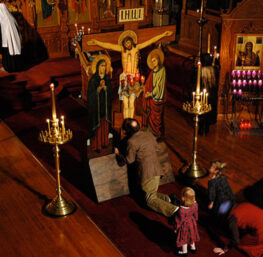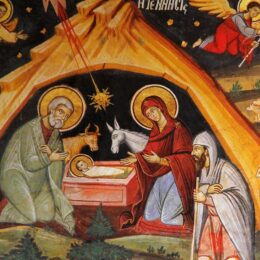September 26, 2004
Feast of St. John the Evangelist
For three and a half days the slain bodies of God’s two faithful witnesses will lie unburied, we are told, “in the street of the great city which spiritually is called Sodom and Egypt, where also our Lord was crucified” (Revelation 11:8-9). The biblical prophets wrote of Sodom (Isaiah 1:10; 3:9) and Egypt (Ezekiel 23:3,8,19,27) as metaphors for rebellious societies, but it is the joining of these two images in Revelation that seems especially significant.
In fact, several striking features of correspondence connect the ancient stories of Sodom and Egypt in Genesis and Exodus. First, both accounts portray the deliverance of the just from the midst of the unjust; Lot’s family is saved from Sodom, the Israelites from Egypt. Second, each narrative includes the violent loss of life among the respective inhabitants; fire and brimstone descend on the Sodomites, and the tenth plague is inflicted on the Egyptians, followed by the destruction of Pharaoh’s army at the Red Sea. Third, the citizens of both places are punished for oppressing those who sojourned among them; the two angels were menaced in Sodom, and the Israelites were oppressed in Egypt. Fourth, Sodom and Egypt are both punished by cataclysmic forces of nature, whether by the fiery overthrow of the first or the several natural calamities befalling the other. Lastly, just before their ultimate destruction the sinful inhabitants of both Sodom and Egypt are overwhelmed with consummate darkness. This final correspondence, I submit, deserves further comment.
With respect to the menacing Sodomites, the Sacred Text says that the two angels “struck the men who were at the doorway of the house with blindness, both small and great, so that they became weary trying to find the door” (Genesis 19:11). This darkness of the sinners at Sodom is their penultimate punishment, immediately preceding their destruction. Apparently their blindness lasts to the end. We picture them still groping blindly in the dark when the pitch and brimstone begin to fall.
In the corresponding text in Exodus, the thick darkness of the ninth plague descended on the Egyptians, so that they “did not see one another; nor did anyone rise from his place for three days” (Exodus 10:23). Whereas in some of the previous eight plagues of Egypt Moses had attended to the pleas of Pharaoh and removed the affliction by his prayer to the Lord (8:13,31; 9:33; 10:19), it does not happen this time. As far as we may discern from the Sacred Text, this pervading darkness of Egypt, which immediately precedes the slaying of the firstborn sons, endures until Israel’s departure.
The striking correspondence between these two stories in Genesis and Exodus was observed a long time ago. Indeed, already in the first century before Christ the anonymous author of The Book of Wisdom (The Wisdom of Solomon) compared both the offenses and the punishments of Sodom and Egypt.
With respect to their offenses, the author of Wisdom observes, the Egyptians were guiltier than the Sodomites. In Sodom, after all, the menace had been directed against total strangers, whereas the Egyptians oppressed their “friends,” who had lived among them for a long time and had shared their common life and laws (19:13-16).
With respect to punishments, the author of Wisdom describes the Sodomites stricken and surrounded with “horrible great darkness,” endeavoring to find their way home from “the doors of the righteous man” Lot (19:17). The darkness over Egypt, however, was worse and lasted three times as long. During this time the Egyptians were shut up in their houses, harassed with fear, exiled from God’s “eternal providence,” unable to remember anything except the torments of their guilt (17:2-3). Because this darkness was internal, no fire could pierce it, nor were the lights of heaven able to dispel it (17:5). On the contrary, the darkness of Egypt seemed to come from another and mysterious sort of fire (17:6). Because of Egypt’s long addiction to the dark arts (17:7), it was now tormented with a profound darkening of the mind, which included the loss of reason (17:8-12).
The darkness chosen by Sodom and Egypt was, in a sense, that original, chaotic darkness “on the face of the deep,” antecedent to God’s summoning of the light. It was the shadow of irreversible damnation.




I have always been perplexed by these readings. Lot’s family is considered “just” despite Lot’s willingness to sacrifice the lives of his daughters and despite his daughters incestual relationship with their father (who impregnates them). It is interesting also that this “hospitality towards guests” holds a high, high reverance in the Middle East to this day, far beyond the respect granted to the familial bonds with the female members of one’s family (who are generally considered property still).
I am curious as to the origin of this cultural priority …
Bill?
I’m looking some things up… stay tuned…
Ah … here’s a hint .
Probably important to understand this as it is references in both the Old and New Testaments.
Yes, this says it pretty well. Hospitality isn’t just being nice, but an important social mechanism governing encounters with outsiders. Because one of the overpowering themes in the Old Testament (and also the New) is that God wills that His community look to the outside, not its own inside, to care for the needy stranger, Abraham’s hospitality in Genesis is in fact a concrete illustration of his faith in and obedience to God. The OT, typically, “tells the truth” in story form, not in abstracted definitions. (Hmm. What does that say about what I’m doing here? 🙂 )
I’m looking in a book about the Middle East by Bernard Lewis for more information both on hospitality and on how women are treated.
Ezekial 16:49-50
49 Now this was the sin of your sister Sodom: She and her daughters were arrogant, overfed and unconcerned; they did not help the poor and needy.
50 They were haughty and did detestable things before me. Therefore I did away with them as you have seen.
Dean, are you running Bible software too? Or is this from an online source? Just curious.
This quotation from Ezekiel is relevant to the way in which the example of Sodom is used throughout the OT. But I think James was asking not about the daughters of Sodom, but the daughters of Lot.